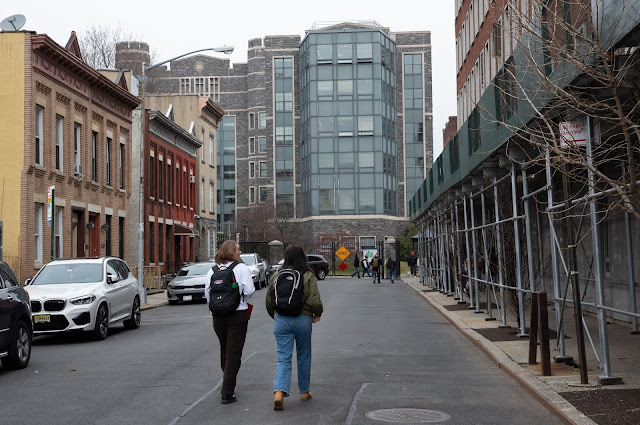This article was originally published on by THE CITY
By Jonathan Custodio, The City
“If the administration comes up with a serious proposal serving the needs of Fordham’s 600+ non tenure track faculty then we would be hopeful — so far that has not happened,” Machanoff emailed. “We’re willing to continue to hold discussions with the Fordham administration just like we have since March 2022.”
‘How to Exploit Labor’
Fordham University, founded in 1841, has an enrollment of 16,986 students taught by 747 full-time instructors, 456 of whom are tenured, according to its website. The university has a $1 billion endowment, and an undergraduate tuition of $54,730.
The university, with a 85-acre main campus in The Bronx and satellite campuses at Lincoln Center in Manhattan and in Westchester, currently pays adjuncts well below the Modern Language Association’s minimum recommended compensation of $11,500 per course. That figure does not factor in the regional cost of living, which is considerably higher in New York City than the national average. The figure is also based on a three course per semester load, while Fordham limits adjuncts to no more than two courses per semester, according to George.
George said the 600-some members of FFU and SEIU Local 200 United teach roughly 1,500 courses per semester, including many of the university’s required entry-level classes.
At least 12 departments, including English, African and African American Studies, and Biology have sent the administration letters in support of the union’s demands.
A letter of support signed by the chairperson and five other full and associate professors of the Natural Sciences Department noted that adjuncts “were responsible for [about] 50% of the classes we offered, an inordinately high percentage” and one that’s increased in recent years.
Fordham spokesperson Bob Howe directed THE CITY to a statement by university President Tania Tetlow made on Nov. 18, in which she said the university has to work in an “academic marketplace” that relies heavily on adjunct faculty, that inflation is affecting the institution’s expenses, and that it is not as “privileged” as schools like Columbia University and New York University in its ability to offer compensation.
“We have so much respect and empathy for our adjunct faculty, and we’re working hard to make a difficult situation better. Like so much else, higher education in this country has become increasingly divided. Universities invested in research by gradually reducing the teaching load of tenure-track faculty. As a result, none but the wealthiest schools could then afford to hire enough tenure-track faculty to cover the curriculum with reduced teaching loads. Instead, most universities have increasingly relied on adjunct faculty to teach, creating a divided and difficult academic marketplace,” said Tetlow.
“Fordham has no choice but to function in that academic marketplace, however, and to stretch our compensation budget across the increasingly divided markets of our employees. … We are working hard to increase compensation for our adjunct faculty within our very real financial limitations.”
In an email on Tuesday, Howe added that the university is hopeful an agreement will be reached following the university’s most recent offer last week.
The threat of an adjunct strike at Fordham comes just after adjunct instructors at The New School in Manhattan, represented by ACT-UAW Local 7902, went on strike for three weeks at the end of the fall semester. The school resorted to an all-remote catalog that featured podcast episodes and readings, before agreeing to a 36% wage increase over five years that would still top out at $7,820 per course.
During the strike, The New School administration required full-time faculty to submit paperwork documenting that they were holding classes as usual during the strike, as parents threatened to sue the university.
For Alex Robins, a part-time adjunct instructor in fashion studies at The New School and part of the union’s executive committee, Fordham’s looming strike is another example of worn-down workers rising up to fight an academic system that takes advantage of adjuncts. Many such instructors often have to teach at multiple schools across the city and region to make ends meet.
“It’s all one unified system of exploitation,” Robins said. “So many adjuncts will teach at multiple schools. And so many of the management groups are receiving the same [worthless] recommendation from consultants on how to exploit labor.”
A New Semester
FFU and SEIU Local 200 United are also negotiating for stronger health benefits. Members currently only have access to what is called a bronze plan that the university contributes nothing towards, according to George, the Fordham adjunct.
The university did not address a question from THE CITY asking how much it contributes to health insurance. In her Nov. 18 statement, Tetlow said Fordham was focusing its offer on wages “because of the extraordinary expense of paying for health care for our part-time adjuncts (an average of $26,000 per employee).”
George said students are often surprised to learn that she lacks health insurance.
“When I tell my students that I don’t have health insurance, they are shocked,” she said.
Assoc. Prof. Alma Rodenas-Ruano, who signed the Natural Sciences Department’s letter supporting union demands, didn’t know how the beginning of a semester would go, if adjuncts and other non-tenture track faculty are not at work.
“I really don’t have a plan, to be honest,” Rodenas-Ruano said.
She received tenure in May after being at the university since 2015, following previous work as an adjunct at Pace University and Bronx Community College. She said that “students will suffer because they come here to learn,” if an agreement is not reached immediately.
“A considerable amount of courses are taught by adjuncts. That is a void that is very difficult to fill,” Rodenas-Ruano said.
THE CITY is an independent, nonprofit news outlet dedicated to hard-hitting reporting that serves the people of New York.













Comments
Post a Comment